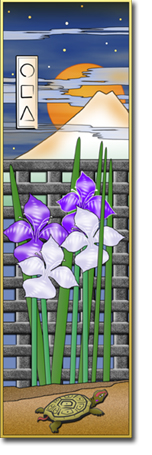On The Way: The Daily Zen Journal
Independence
Foyan (1067-1120)

What do you people come to me for? Each individual should lead life autonomously—don’t listen to what other people say. An ancient declared, “I knew how to lead life by the time I was eighteen.” You people must learn to live independently.
You say, “Lead what life?”
Just do not seek elsewhere. Most people today are compulsively active; this is already not knowing how to lead life. This is called abandoning home, scattering the family, and becoming a drifter. Clearly this is not understanding. Just searching and seeking, studying a bit of intellectual knowledge, memorizing a few sayings is called “hauling manure inside.”
When you get here, our actions have to be truly accurate; eventually it will sink in thoroughly, and then you will understand.
An ancient said, “Everywhere is you. Go east, and it’s you; go west, and it’s you. Who are you?” If you say, “Me,” this is emotional and intellectual consciousness, which you must pass through before you attain realization.
Seek Without Seeking

There is something in each of you that you will only be able to perceive when you turn around. So how does one turn around? By nonseeking seeking, seeking without seeking.
This is precisely what people find hard to deal with or get into. How can you seek if you are not seeking? If you only seek, how is that different from pursuing sounds and chasing forms? If you do not seek at all, how are you different from inert matter?
You must seek, and yet without seeking; not seek, yet still seek. If you can manage to penetrate this, you will then manage to harmonize seeking and nonseeking.
So it is said, “Nonseeking nonseeking—the body of reality is perfectly quiescent. Seeking seeking—responsive function does not miss. Seeking without seeking, nonseeking seeking—objects and cognition merge, substance and function are one.”

Students must be able to turn around and search all the way through in this way before they can attain realization.
In Tune
Don’t say what is speaking right now is It; that’s not quite right. As soon as there is an affirmation, then there is a denial. That is the reason why it is said that no verbal expressions correspond to this reality.

What you must do is live in harmony with it. This matter is not in another; but are you in tune with it? And if you are in tune, in tune with whom?
If you say you are in tune with the ancients, the ancients are gone. If you say you are in tune with a teacher, a teacher has no connection with you.
This is why the sages compassionately told us to tune into the source of our own minds. Now tell me, what is the source of mind, to which one tunes in on one’s own?
If you mindfully try to tune into the mind, you will definitely be unable to tune in. You have to tune in with mindless mind.

Foyan (1067-1120)
excerpted from Instant Zen – Waking up in the Present, translated by Thomas Cleary





Incredible how something written so long ago can remain so relevant today.
Most people today are compulsively active; this is already not knowing how to lead life.
Recall that this was written in the 12th century, quite a while ago.
And for many of us living life “autonomously,” not listening to what others say can feel a bit ungrounded until one has practiced enough to have gained some life experience of cause and effect. Life experience itself is a great teacher, and Nature a more subtle teacher.
Everywhere we see evidence of herd mentality in the conformity our cultures teach us. What it takes to live by one’s own code, which can be out of step with cultural norms, takes a kind of strength. However difficult it is for us today, it was also a challenge for others practicing many years ago.
The second piece reads like a confused koan at first. Isn’t there some kind of safeguard here? Like all koans, it is filled with contradictions and can sound like word play. But actually, it is a pithy way to describe a mindset that releases one from the ego’s obsession with having a goal of enlightenment.
How to do this for oneself? The phrase we heard in practice sums up a kind of safety net for this in “great effort, no goal.” Faith in the Way itself is a kind of open-ended state of relaxation in knowing we are already in the Way. Everything will take care of itself all in good time, but we still need to make the effortless effort.
This is why the sages compassionately told us to tune into the source of our own minds. Now tell me, what is the source of mind, to which one tunes in on one’s own?
All three of these short pieces speak volumes for us today. Which one speaks to you most clearly now?
Balancing it all with you,
Elana, Scribe for Daily Zen